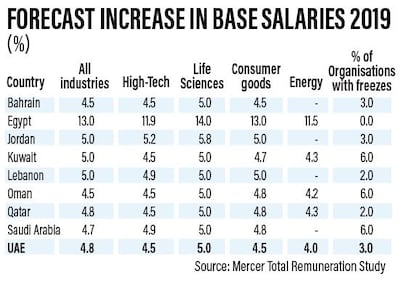Salaries in the UAE are projected to increase by 4.8 per cent next year across all industries as the job market heats up amid the government’s diversification efforts, a new report has found.
Most industries in the Emirates will receive a pay rise in 2019 – the best outlook in the GCC - with the strongest push to come in the life sciences (pharmaceuticals and health care), consumer goods and high-tech industries, according to the Total Remuneration Study from the global consulting firm Mercer.
New hiring, talent and compensation trends are emerging as the UAE realises its vision of diversifying away from oil, said Ted Raffoul, career products leader for Mena at Mercer.
“The GCC and UAE economies tend to be very reliant on the price of oil and the performance of the energy industry because you have government spending in the market based on that,” he said. “We have had quite low oil prices over the last couple of years and that has picked up in 2018, which is why we are seeing higher projections for 2019.”
The UAE jobs market has received a boost in recent months due to a raft of reforms, such as more flexible visa options, economic stimulus measures and a new private sector insurance policy. All of these steps rolled out by the government are designed to accelerate economic growth, create jobs and diversify the economy.
__________
Read more:
Residents consider leaving UAE over cost of living and stagnant salaries
UAE economy growth drives 'war on talent' for tech professionals
A fifth of UAE expatriates doubled their salary when they relocated
Is the UAE's new five-year visa a game changer for expat retirement?
Domestic workers and employers in UAE to benefit from new low-cost employee insurance policy
_________
“Many of the government reforms we are seeing are actually coming from Abu Dhabi because its economy is much more reliant on oil so, yes, that is also helping – but that does not happen overnight and is something that is going to keep having an effect for some time,” said Mr Raffoul.
Diversification will bolster the economy against the effects of a future drop in oil prices, he added.
The reforms, along with a wider digital technology adoption, has left UAE business leaders feeling more confident about their companies' prospects for next year, as growth in the economy drives demand for high-skilled professionals, according to the Robert Half 2019 Salary Guide, released last week. The study found that 89 per cent of chief financial officers are optimistic about their company's outlook with the fresh momentum in the economy leading to a "war" for digitally savvy talent.
This is also reflected in Mercer’s survey, which found that overall salaries in the UAE increased by 4.5 per cent this year, with the biggest pay rise of 5 per cent awarded to those in the life sciences sector.
Looking to next year, real wage growth (salary increase minus inflation rate) is also expected to steadily rise in the region, with the life sciences, consumer goods and high-tech industries, in particular, generating more employment opportunities and salary increases.
David Mackenzie, the managing director of the GCC recruitment consultancy Mackenzie Jones, said salary rises of 4.9 per cent in 2019 are likely across certain industries like the tech and digital industries.
"The energy and other sectors have suffered recently but are now starting to do well due to the increase in the price of oil from $30 in mid-2015 to about $80 now, and these will get significant increases," he said. "Retail and education will be suffering next year and so they will have to pay more to keep the better people from leaving."
Mr Raffoul said the UAE had the best salary outlook in the GCC because it houses more multinational organisations outside the energy sector.
“If you look at other countries like Saudi Arabia, Kuwait and Oman, those markets are a lot more reliant on the oil and gas industry – so the UAE has reacted in a better manner to other economies just because they have other things to rely on,” he said.
However, Egypt has the best outlook in the wider region with an expected salary increase of 13 per cent for 2019. However that figure does not reflect the full story.
“Due to the Egyptian currency devaluation at the end of 2016, inflation has skyrocketed over the last couple of years. It is in fact the lowest it’s been since 2016, but still quite high relative to other countries in the region," said Mr Raffoul. "These high salary increases are meant to address this high inflation – however these increases are actually below the inflation figures, which means there’s a purchasing power decrease in Egypt despite the high salary increase numbers."
Another interesting figure applies to the energy industry, previously the highest paying sector in the UAE. It is expected to perform below the market in 2019 with an expected increase of 4 per cent next year. However, Mr Raffoul said the fact there are pay rises, even though they are lower than other industries, is still positive.
“The downward shift actually happened a couple of years ago at the end of 2015 when the price of oil went down and that caused a salary freeze for some time,” he said.
_________
Read more:
The five-step guide to low-cost offshore investing for UAE residents
Personal finance in the UAE: Residents track finances better but struggle with saving and debt
Retiree visas: wills and property firms expect surge in demand from older residents
Explained: What the UAE's new low-cost insurance policy means for you
_________
When it comes to hiring, again the outlook is positive with close to half of the companies polled looking to increase their head count next year, and 45 per cent planning to maintain their staffing levels, according to Mercer.
On another positive note, only 3 per cent of the companies imposed salary freezes in 2018 compared to 10 per cent in 2016.
For those looking to boost employee numbers, the study found the competition for talent will be fierce in 2019.
While 78 per cent of organisations expecting an increase in competition for talent in the GCC, just under half noted there are not enough experts in niche fields, and that scarcity of required talent may pose a potential challenge.
“There is a war on talent for different reasons. A lot of companies, even in industries that are doing well, are undergoing some sort of transformation now,” said Mr Raffoul. “There is a lot of talk about the future of work, how jobs are evolving and how different industries are evolving and going digital – making a significant difference to businesses and economies. That skill set for digital thinking is quite rare so as a result when you have this demand it also drives up the prices/salaries of people and we are definitely seeing that in the region here.”
Mr Raffoul said homegrown tech businesses such as Careem and dubizzle have shown traditional brick-and-mortar concepts how their business can be enabled through technology, with these companies also looking to enhance their digital offering to reach new customers.
When it comes to employing Emiratis, the Mercer study found in 2018 there was a 71 per cent increase in companies offering the national allowance - an additional allowance to beef up salary packages and motivate local talent to accept and hold positions in the private sector – compared to 2017.
Maxime Jallageas, as associate at Mercer, said 53 per cent of respondents placed labour nationalisation requirements as a top GCC economic and social issue that is likely to have an impact on organisations over the next two years.
“This will have a clear and direct impact on the hiring trends firms will adopt, particularly on the reward mechanisms that are put in place to attract local talent,” said Mr Jallageas.



